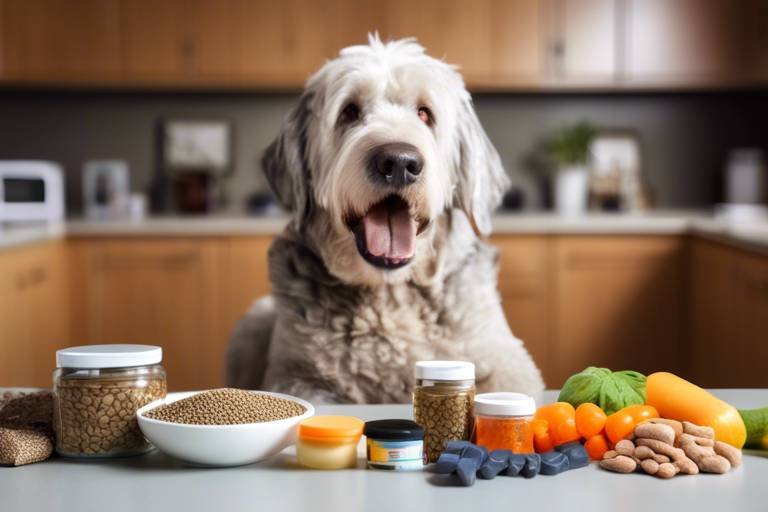How to Recognize Symptoms of Senior Pet Heart Disease
As our furry companions grow older, it’s essential to stay vigilant about their health, particularly when it comes to heart disease. Just like humans, pets can suffer from heart-related issues, and unfortunately, these problems often go unnoticed until they become severe. Recognizing the symptoms of heart disease in senior pets is crucial for ensuring they receive the timely care they need. Imagine your pet as a ticking clock; every sign of distress is a tick that could lead to a bigger problem if ignored. By understanding the signs, you can act quickly, ensuring your beloved companion remains happy and healthy.
Heart disease in pets can manifest in various forms, and it’s not always easy to spot. Some symptoms may be subtle, while others can be quite pronounced. Pet owners should familiarize themselves with the potential signs to take preventive measures effectively. Think of it as being a detective in your pet’s life—observing their behavior, noting any changes, and piecing together clues that could lead to a diagnosis. This proactive approach is vital in maintaining your pet's quality of life.
Heart disease in senior pets can stem from a variety of causes, including congenital defects, heartworm disease, or simply the aging process. The heart, being the engine of the body, requires regular maintenance. Just as you would take your car for regular check-ups, your pet needs the same attention. Knowing the types of heart disease—such as congestive heart failure, arrhythmias, and valve disease—can empower you to recognize potential risks. This knowledge serves as your toolkit, helping you identify when something might be amiss.
Recognizing the common symptoms of heart disease is crucial for any pet owner. Symptoms such as coughing, lethargy, and difficulty breathing can indicate underlying issues that require immediate veterinary attention. It’s essential to remember that these symptoms can sometimes be mistaken for other ailments, but if they persist, a visit to the vet is warranted. Think of your pet as your best friend; if they’re not acting like themselves, it’s time to dig deeper.
Persistent coughing or wheezing in senior pets may signal heart disease. Understanding the differences between normal and concerning respiratory sounds can help owners identify when to seek veterinary advice. For instance, a cough that sounds dry and hacking could be a sign of heart strain, while a wet cough might indicate fluid buildup in the lungs. It's crucial to pay attention to the frequency and duration of these coughs.
Monitoring how often and how long your pet coughs can provide vital clues. Frequent coughing, especially during rest or sleep, may indicate heart strain and should prompt a veterinary examination. Just like a smoke alarm going off in your home, persistent coughing is a signal that something isn't right. Don’t ignore those alarms!
Coughing may not occur in isolation. When combined with other symptoms such as fatigue or reduced appetite, it can strengthen the case for a thorough veterinary evaluation. If your pet seems unusually tired or disinterested in their favorite activities, these could be red flags that warrant a vet visit.
Lethargy and weakness are common indicators of heart disease. If a senior pet shows decreased activity levels or reluctance to engage in play, it may be time to consult a veterinarian. Picture your pet as a once-energetic child who suddenly wants to stay indoors all day. If their zest for life seems to be fading, it’s essential to investigate further.
Behavioral changes can be subtle yet significant. Owners should be aware of shifts in mood, appetite, and interaction levels, as these can signal underlying heart issues. For instance, if your pet who once loved to cuddle suddenly retreats to a corner, it might be a sign of discomfort. Just like humans, pets can experience emotional changes when they’re not feeling well.
A sudden change in eating habits can indicate health problems, including heart disease. Monitoring food intake and seeking veterinary advice for significant changes is essential for pet health. If your pet refuses their favorite treats or shows disinterest in meals, it’s time to take notice. Their appetite is like a window into their health—if it’s cloudy, something might be wrong.
Increased anxiety or restlessness may be a response to discomfort caused by heart disease. Understanding these behavioral changes can help owners provide better care and support for their pets. If your pet seems more anxious than usual, pacing around the house or hiding, it could be their way of expressing that something is off. Just like a child who can’t sit still when they’re anxious, pets can exhibit similar behaviors.
Regular veterinary checkups are essential for early detection of heart disease. Routine examinations can help identify potential issues before they become serious, ensuring the health and well-being of senior pets. Think of these checkups as a safety net; they catch problems before they spiral out of control. By maintaining a schedule of regular visits, you can be proactive about your pet’s health, allowing them to enjoy their golden years with vigor and joy.
Q: How often should I take my senior pet to the vet?
A: It's recommended to take senior pets for checkups at least twice a year to monitor their health closely.
Q: What should I do if I notice symptoms of heart disease?
A: If you observe symptoms such as coughing, lethargy, or changes in behavior, consult your veterinarian immediately for a thorough evaluation.
Q: Are certain breeds more prone to heart disease?
A: Yes, some breeds, like Cavalier King Charles Spaniels and Boxers, are genetically predisposed to heart issues. Regular checkups are crucial for these breeds.

Understanding Heart Disease in Pets
Heart disease in senior pets can be a daunting topic for many pet owners. Just like humans, our furry friends can suffer from various heart conditions that can significantly impact their quality of life. Understanding what heart disease is, how it develops, and the types of heart conditions that can affect pets is crucial for early detection and treatment. The heart is a vital organ, responsible for pumping blood throughout the body, delivering oxygen and nutrients to tissues while removing waste products. When this function is compromised, it can lead to serious health issues.
There are several types of heart disease that can affect senior pets, including:
- Congenital Heart Disease: These are conditions that pets are born with, often affecting the heart's structure and function.
- Acquired Heart Disease: This type develops over time, often due to factors such as age, obesity, or infections.
- Valvular Heart Disease: Common in older dogs, this occurs when the heart valves become thickened or leaky, affecting blood flow.
- Cardiomyopathy: This condition affects the heart muscle itself, leading to weakened contractions and reduced efficiency in pumping blood.
Understanding the causes of heart disease is equally important. Some common factors include:
- Genetics: Certain breeds are predisposed to heart conditions, making it essential to be aware of breed-specific risks.
- Obesity: Overweight pets are at a higher risk for heart disease, as excess weight puts additional strain on the heart.
- Age: As pets age, their risk of developing heart disease increases, making regular check-ups vital.
- Diet: Poor nutrition can lead to obesity and other health issues that contribute to heart disease.
Recognizing the potential risks and understanding the types of heart disease can empower pet owners to take proactive measures. Regular veterinary visits, a balanced diet, and maintaining a healthy weight are just a few steps that can help mitigate these risks. It's not just about prolonging life; it's about ensuring that the life our pets lead is filled with joy and vitality.
In conclusion, heart disease in senior pets is a complex issue that requires awareness and understanding from pet owners. By recognizing the signs, knowing the types and causes, and maintaining open communication with veterinarians, we can help our furry companions live healthier, happier lives.

Common Symptoms of Heart Disease
Recognizing the common symptoms of heart disease is crucial for every pet owner, especially when it comes to our senior furry friends. Just like humans, pets can experience a variety of heart-related issues as they age. This can lead to serious health complications if not addressed promptly. The signs of heart disease can be subtle at first, often mistaken for normal aging behaviors. However, being vigilant can make all the difference in ensuring your pet's health and well-being.
Among the most prominent symptoms to watch for are coughing, lethargy, and difficulty breathing. Each of these symptoms can indicate underlying issues that require immediate veterinary attention. For instance, a persistent cough might not just be a sign of a simple cold; it could indicate a more serious heart condition. Similarly, if your pet seems less enthusiastic about their favorite activities or is reluctant to play, it might be time to take a closer look at their heart health.
Persistent coughing or wheezing in senior pets is often a red flag. Many pet owners may dismiss these sounds as mere signs of aging or seasonal allergies, but understanding the differences between normal and concerning respiratory sounds can help owners identify when to seek veterinary advice. For example, a dry cough that occurs frequently, especially during rest, may indicate heart strain. This is particularly concerning if the cough is accompanied by other symptoms.
Monitoring how often and how long your pet coughs can provide vital clues. If you notice that your pet coughs more than usual or if the coughing episodes last longer than a few minutes, it’s wise to consult your veterinarian. Frequent coughing, especially during rest, can signal that your pet's heart is working harder than it should be. Consider keeping a log of these episodes, as this information can be incredibly helpful during your vet visit.
It’s also important to note that coughing may not occur in isolation. If your pet is coughing and also displaying other symptoms such as fatigue, reduced appetite, or difficulty breathing, it strengthens the case for a thorough veterinary evaluation. These symptoms can indicate that the heart is not pumping effectively, leading to fluid buildup in the lungs or other complications.
Lethargy and weakness are common indicators of heart disease. If your senior pet shows decreased activity levels or seems reluctant to engage in play, it may be time to consult a veterinarian. Pets that once loved to chase their toys or go for walks might suddenly prefer to lie down or sleep. This change in behavior can be alarming, and it’s essential to pay attention to these signs. Remember, a sudden shift in energy levels can often be the body’s way of signaling that something is wrong.
In conclusion, being aware of these common symptoms of heart disease can empower pet owners to take action before it's too late. Regular monitoring and open communication with your veterinarian can help ensure that your beloved pet receives the care they need to live a long and healthy life.
- What should I do if I notice symptoms of heart disease in my pet? It's essential to schedule a veterinary appointment as soon as possible for a thorough examination.
- Can heart disease be prevented in senior pets? While not all heart diseases are preventable, regular checkups, a healthy diet, and exercise can help reduce risks.
- What treatments are available for pets diagnosed with heart disease? Treatment options can vary widely, including medication, dietary changes, and in some cases, surgery.
- How often should senior pets see the vet? It's generally recommended that senior pets have checkups at least twice a year to monitor their health closely.
Coughing and Wheezing
Coughing and wheezing are two of the most noticeable signs that something might be amiss with your senior pet's heart health. Just like when we humans experience a persistent cough, it can be a signal that our bodies are trying to communicate a problem. For our furry friends, these sounds can indicate a range of issues, from minor irritations to serious heart diseases. It's crucial for pet owners to pay close attention to these respiratory changes, as they often serve as the first alarm bells for underlying health issues.
So, how do you differentiate between a normal cough and one that could be concerning? Typically, a healthy cough in pets is rare and usually occurs due to external factors like dust or a minor throat irritation. However, a persistent cough or wheezing, especially if it happens frequently, should raise a red flag. If your pet is coughing more than usual or if the cough lasts longer than a few days, it’s time to consult your veterinarian.
When monitoring your pet's coughing, consider the frequency and duration of these episodes. For instance:
| Type of Cough | Implication |
|---|---|
| Occasional Coughing | Possible minor irritation |
| Frequent Coughing | Potential heart strain |
| Coughing During Rest | Serious concern; needs veterinary evaluation |
Additionally, coughing often doesn’t happen in isolation. It’s usually accompanied by other symptoms, which could provide a clearer picture of your pet’s health. For instance, if your pet is also showing signs of fatigue, reduced appetite, or shortness of breath, these could all be indicators of heart disease. The combination of these symptoms can strengthen the case for a thorough veterinary evaluation.
In summary, if your senior pet starts to cough or wheeze, don’t just brush it off as a passing cold. Instead, take a closer look at the context of these symptoms. Are they frequent? Are they accompanied by other concerning signs? Remember, early detection is key in managing heart disease effectively, so don’t hesitate to reach out to your vet.
- What should I do if my pet starts coughing?
Monitor the frequency and duration of the cough, and consult your veterinarian if it persists. - Can coughing indicate other health problems?
Yes, coughing can be a sign of various conditions, not just heart disease. It's essential to get a professional diagnosis. - How can I help my pet if they are diagnosed with heart disease?
Follow your vet's recommendations, which may include medication, dietary changes, and regular check-ups.
Frequency and Duration of Coughing
When it comes to our furry friends, understanding the frequency and duration of coughing can be a game changer in recognizing potential heart issues. If you notice your senior pet coughing more often than usual, it's crucial to take note. Coughing isn't just a minor annoyance; it can be a significant indicator of underlying health problems, especially heart disease. Imagine your pet trying to communicate with you through those coughs, signaling that something isn't quite right. So, what should you be looking for?
First, consider how often your pet coughs. Is it a rare occurrence, or does it seem to happen multiple times a day? A persistent cough that occurs frequently, particularly when your pet is resting or sleeping, can indicate that their heart is under strain. This is similar to how we might feel tightness in our chest when we're stressed—it's the body’s way of signaling that something needs attention.
Next, think about the duration of the cough. Is it a quick, occasional bark? Or does it linger, causing your pet to seem uncomfortable? A cough that lasts for more than a few minutes or recurs several times in a short span should raise a red flag. The longer the duration, the more likely it is that there’s an underlying issue that warrants a trip to the vet.
Additionally, it's important to observe the context in which the coughing occurs. For example, if your pet starts coughing after exertion or during excitement, it could indicate that their heart is struggling to keep up with their activity level. In contrast, a cough that happens during rest could suggest fluid buildup in the lungs, which is often associated with heart problems. Being attentive to these patterns can provide valuable insights into your pet's health.
In summary, monitoring the frequency and duration of your pet's cough can be a vital part of their health care. If you notice any concerning changes, don’t hesitate to reach out to your veterinarian. Remember, early detection can make all the difference in ensuring your beloved companion continues to live a happy and healthy life.
- What should I do if my pet is coughing frequently?
It's essential to consult your veterinarian as soon as possible to determine the underlying cause. - Can heart disease be treated in pets?
Yes, while heart disease can be serious, many treatments are available that can help manage the condition and improve your pet's quality of life. - How often should senior pets have checkups?
Senior pets should ideally have checkups at least twice a year to monitor their health closely.
Associated Symptoms
This article explores the signs and symptoms of heart disease in senior pets, providing pet owners with essential information to ensure their furry companions receive timely care and treatment.
Heart disease in senior pets can manifest in various forms. Knowing the types and causes helps pet owners recognize potential risks and take preventive measures for their beloved companions.
Recognizing the common symptoms of heart disease is crucial. Symptoms such as coughing, lethargy, and difficulty breathing can indicate underlying issues that require immediate veterinary attention.
Persistent coughing or wheezing in senior pets may signal heart disease. Understanding the differences between normal and concerning respiratory sounds can help owners identify when to seek veterinary advice.
Monitoring how often and how long your pet coughs can provide vital clues. Frequent coughing, especially during rest, may indicate heart strain and should prompt a veterinary examination.
Coughing may not occur in isolation. It is often accompanied by a variety of other symptoms that can paint a clearer picture of your pet's health status. For example, if your furry friend is experiencing coughing along with:
- Lethargy: A noticeable drop in energy levels, where your pet seems less enthusiastic about their usual activities.
- Reduced Appetite: A sudden disinterest in food can be a red flag, especially if your pet usually has a hearty appetite.
- Difficulty Breathing: This may manifest as rapid breathing or an unusual posture, such as sitting or standing with their head extended.
- Swelling in the Abdomen: This can indicate fluid buildup, which is often associated with heart problems.
These associated symptoms can strengthen the case for a thorough veterinary evaluation. It’s essential for pet owners to take note of any combinations of these signs, as they can indicate a more serious underlying condition that requires immediate attention. For instance, if your pet is both coughing and exhibiting lethargy, it could suggest that their heart is struggling to pump blood effectively, leading to a decrease in oxygen supply to their body. This is a situation that should never be taken lightly.
Lethargy and weakness are common indicators of heart disease. If a senior pet shows decreased activity levels or reluctance to engage in play, it may be time to consult a veterinarian.
Behavioral changes can be subtle yet significant. Owners should be aware of shifts in mood, appetite, and interaction levels, as these can signal underlying heart issues.
A sudden change in eating habits can indicate health problems, including heart disease. Monitoring food intake and seeking veterinary advice for significant changes is essential for pet health.
Increased anxiety or restlessness may be a response to discomfort caused by heart disease. Understanding these behavioral changes can help owners provide better care and support for their pets.
Regular veterinary checkups are essential for early detection of heart disease. Routine examinations can help identify potential issues before they become serious, ensuring the health and well-being of senior pets.
Here are some common questions pet owners have regarding heart disease in senior pets:
| Question | Answer |
|---|---|
| What are the early signs of heart disease in pets? | Early signs may include coughing, lethargy, and difficulty breathing. |
| How often should I take my senior pet for checkups? | It's recommended to take senior pets for checkups at least twice a year. |
| Can heart disease be treated? | Yes, many forms of heart disease can be managed with medication and lifestyle changes. |
| Is heart disease hereditary in pets? | Yes, certain breeds are more prone to heart disease, so genetics can play a role. |
Lethargy and Weakness
Lethargy and weakness in senior pets are often more than just signs of aging; they can be red flags indicating heart disease. Imagine your once-energetic pup who used to bound across the yard now lounging on the couch, barely lifting a paw. This shift in energy levels can leave pet owners feeling concerned and puzzled. It's essential to understand that while some degree of lethargy is normal as pets age, a noticeable decline in activity or enthusiasm for play can be a cause for alarm.
When your furry friend seems uninterested in their favorite activities, it’s time to take notice. Are they avoiding walks they once loved? Do they seem less excited about playtime or even their favorite treats? These behavioral changes can be indicative of underlying heart issues. The heart works tirelessly to pump blood, and when it struggles, it can lead to fatigue and a lack of strength in your pet. If your pet is exhibiting these signs, it’s crucial to consult a veterinarian for a thorough examination.
In addition to physical activity, lethargy can also affect your pet's overall demeanor. For instance, if your pet appears more withdrawn or irritable, this could signal discomfort. Just like humans, pets can experience emotional changes linked to their physical health. It's important to monitor not just their activity levels but also their mood and interactions with family members. A pet that suddenly prefers solitude over snuggling might be trying to tell you something.
To help you identify lethargy and weakness in your pet, consider the following signs:
- Decreased interest in play or exercise
- Longer periods of sleeping or resting
- Difficulty standing up or moving around
- Reluctance to engage with family members
Recognizing these symptoms early can make a significant difference in your pet's health. If you suspect that your senior pet is experiencing lethargy or weakness, don’t hesitate to reach out to your veterinarian. Early intervention can lead to better outcomes and ensure your beloved companion continues to enjoy a happy and healthy life.
Q: How can I tell if my pet's lethargy is serious?
A: If your pet shows a sudden change in energy levels, especially if combined with other symptoms like coughing, difficulty breathing, or changes in appetite, it’s best to consult your veterinarian promptly.
Q: What are some common causes of lethargy in senior pets?
A: Lethargy can be caused by various issues, including heart disease, arthritis, infections, or even depression. A thorough veterinary examination is essential for determining the underlying cause.
Q: Can diet affect my pet's energy levels?
A: Yes! A balanced diet is crucial for maintaining your pet's energy levels. Poor nutrition can lead to weakness and lethargy, so ensure your pet is getting the right nutrients for their age and health condition.
Q: How often should I take my senior pet to the vet?
A: It's advisable to take senior pets for checkups at least twice a year. Regular veterinary visits can help catch potential health issues early, including heart disease.

Behavioral Changes in Senior Pets
As our furry friends age, their behavior can change in ways that may seem subtle but are significant. It's essential for pet owners to be vigilant and recognize these changes. Just like humans, pets can experience shifts in mood, energy levels, and social interactions as they age. These behavioral changes can often be the first indicators of underlying health issues, including heart disease.
One major area to monitor is a pet's eating habits. A sudden change in appetite, whether it's eating less or even refusing food altogether, can be a red flag. For instance, if your once-voracious eater suddenly turns their nose up at dinner, it could indicate discomfort or pain that warrants further investigation. Keeping a close eye on their food intake can help you catch potential problems early. If you notice a significant change, don't hesitate to consult your veterinarian.
Another aspect to consider is increased anxiety or restlessness. Senior pets may become more anxious or restless due to discomfort caused by heart disease or other health issues. You might find them pacing around the house, unable to settle down, or exhibiting signs of distress that they didn’t show before. This behavior can be alarming for pet owners, but understanding the root cause can help you provide better care and support. If your pet seems more anxious than usual, it’s worth discussing with your vet to rule out any underlying health concerns.
Additionally, watch for changes in how your pet interacts with you and their environment. Senior pets might become less social, preferring to isolate themselves rather than engage in playtime or cuddle sessions. This withdrawal can be a signal that they are not feeling well. On the flip side, some pets may seek more attention and affection, possibly as a way to cope with their discomfort. Recognizing these shifts can help you better understand your pet’s needs and ensure they receive the appropriate care.
To sum it up, being aware of these behavioral changes is crucial for the health and happiness of your senior pet. By monitoring their eating habits, anxiety levels, and social interactions, you can catch potential issues early and seek veterinary advice when necessary. Remember, your pet relies on you to notice these changes and advocate for their well-being!
- What are the signs of heart disease in senior pets? Common signs include coughing, lethargy, difficulty breathing, and changes in appetite.
- How often should I take my senior pet to the vet? Regular checkups, at least once a year, are recommended for senior pets to catch any potential health issues early.
- Can behavioral changes in my pet be related to heart disease? Yes, changes in behavior, such as increased anxiety or changes in eating habits, can indicate underlying health issues, including heart disease.
Changes in Eating Habits
Changes in a senior pet's eating habits can be one of the most telling signs of underlying health issues, including heart disease. As a pet owner, it's crucial to be vigilant and aware of what constitutes a normal eating pattern for your furry friend. When your pet suddenly loses interest in their favorite meals or starts eating less than usual, it can be alarming. It's not just about the food bowl being less full; it’s about their overall health and well-being.
For instance, if your dog, who usually devours his kibble within minutes, suddenly takes hours to finish his meal or walks away from it entirely, this could be a red flag. Similarly, a cat that used to eagerly greet you at mealtime but now seems disinterested may be trying to tell you something is wrong. These changes can indicate discomfort or a lack of energy, both of which can be linked to heart problems.
To help you better understand what to look for, consider the following factors that may indicate a change in your pet's eating habits:
- Decreased Appetite: If your pet is eating significantly less than usual, it’s time to take notice.
- Increased Thirst: Sometimes, pets may drink more water if they are not eating well, which can also be a sign of health issues.
- Weight Loss: Unexplained weight loss is a serious concern and should prompt an immediate veterinary visit.
- Food Preferences: A sudden change in what your pet likes to eat can also indicate health problems.
It’s essential to keep a close eye on these changes, as they can often be accompanied by other symptoms of heart disease, such as lethargy or coughing. If you notice any significant shifts in your pet’s eating habits, it’s advisable to consult your veterinarian as soon as possible. They can perform the necessary examinations and tests to determine if heart disease or another health issue is at play.
In summary, being aware of your senior pet's eating habits is not just about ensuring they get their meals; it's about monitoring their overall health. Just like we pay attention to our own eating patterns for signs of health issues, our pets rely on us to notice when something is off. Remember, prompt action can make a world of difference in your pet's life!
Q: What should I do if my pet stops eating?
A: If your pet stops eating for more than a day, it's crucial to consult your veterinarian. This could indicate a serious health issue, including heart disease.
Q: How can I tell if my pet is eating less than usual?
A: Keep track of your pet's eating habits. If they are not finishing their meals regularly or seem disinterested in food, these could be signs of a problem.
Q: Are there specific foods that can help support heart health in pets?
A: Yes, diets rich in omega-3 fatty acids and antioxidants can be beneficial. Always consult your vet before making significant changes to your pet's diet.
Q: How often should I take my senior pet to the vet?
A: Senior pets should ideally have veterinary checkups at least twice a year to monitor their health and catch any issues early.
Increased Anxiety or Restlessness
Have you ever noticed your furry friend pacing around the house, unable to settle down? This can be more than just a case of the jitters; it can often indicate underlying heart disease in senior pets. Just like humans, our pets can experience discomfort that manifests in their behavior. When their hearts struggle to pump blood effectively, it can lead to feelings of unease and anxiety. Imagine trying to run a marathon while gasping for air—this is how your pet might feel when their heart is not functioning properly.
Increased anxiety in pets can show up in various ways. You might see them panting excessively, even when they are at rest, or perhaps they are more clingy than usual, seeking your presence as a source of comfort. These changes can be subtle, but they are significant. If your pet is suddenly less interested in their favorite toys or seems to be hiding away more often, it’s time to take a closer look. Behavioral changes can be like a red flag, waving at you to pay attention.
Moreover, there are several factors that can contribute to this increased anxiety. A sudden change in routine, a new environment, or even changes in the household can all play a role. However, if these changes coincide with other symptoms, such as coughing or lethargy, it’s crucial to consult your veterinarian. They can help determine whether the anxiety is a byproduct of heart issues or if there are other underlying health concerns.
To help you understand the signs better, here are some common behaviors that may indicate your pet is experiencing anxiety due to heart problems:
- Pacing back and forth or unable to settle down
- Excessive barking or vocalizing
- Hiding or seeking more attention than usual
- Destructive behavior, like chewing or scratching
Recognizing these signs early can make a world of difference. If you suspect that your pet is feeling anxious or restless, don’t hesitate to reach out to your veterinarian. They can conduct a thorough examination and recommend appropriate treatment options. Remember, just as we wouldn’t ignore our own feelings of discomfort, we shouldn’t overlook our pets' anxiety either. After all, they rely on us to advocate for their health and happiness.
Q: How can I tell if my pet's anxiety is related to heart disease?
A: Look for other symptoms such as coughing, lethargy, or changes in appetite. If your pet is showing signs of anxiety along with these symptoms, consult your veterinarian.
Q: What can I do to help my anxious pet?
A: Providing a calm environment, maintaining a routine, and offering comfort items can help. However, if anxiety persists, seek veterinary advice for potential underlying issues.
Q: Are there specific breeds more prone to heart disease?
A: Yes, certain breeds like Cavalier King Charles Spaniels, Boxers, and Dachshunds are more susceptible to heart conditions. Regular check-ups are essential for early detection.

Importance of Regular Veterinary Checkups
When it comes to our furry friends, prevention is always better than cure. Regular veterinary checkups play a crucial role in maintaining the health and well-being of senior pets. Just like humans, pets can develop health issues that often go unnoticed until they become severe. By scheduling routine visits to the vet, pet owners can catch potential problems early on, giving their beloved companions a better chance at a long, healthy life.
During these checkups, veterinarians perform a thorough examination, which typically includes:
- Physical Assessment: A hands-on evaluation of your pet’s body to check for any abnormalities.
- Weight Monitoring: Keeping an eye on your pet's weight can help identify health issues like obesity or malnutrition.
- Blood Tests: These can reveal underlying conditions that might not be visible during a physical exam.
- Heart Health Evaluation: Listening to your pet’s heart can help detect murmurs or irregularities early.
Imagine your pet as a car; regular maintenance can prevent breakdowns. Just like you wouldn't wait for your vehicle to break down before taking it to the mechanic, you shouldn't wait for symptoms to arise before visiting the vet. Early detection through checkups can lead to timely interventions, which can drastically improve your pet's quality of life.
Moreover, these visits aren't just about diagnosing problems; they are also an opportunity for pet owners to ask questions and discuss any behavioral changes they've noticed at home. For instance, if you’ve observed your senior pet being less active or more anxious, sharing these observations with your veterinarian can lead to valuable insights and recommendations tailored to your pet's specific needs.
In addition to physical health, regular checkups also allow for vaccinations and preventive care, which are vital in protecting your pet from various diseases. This proactive approach can save you from the heartache of dealing with serious health conditions down the line.
To sum it up, regular veterinary checkups are not just a good idea; they are a necessity for senior pets. They help in:
- Early detection of heart disease and other health issues.
- Maintaining vaccinations and preventive care.
- Providing pet owners with peace of mind.
So, if you haven't scheduled a checkup for your furry friend lately, now is the time! Remember, your pet relies on you to keep them healthy, and regular veterinary visits are a vital part of that responsibility.
Q: How often should I take my senior pet to the vet?
A: Generally, senior pets should see the vet at least twice a year for checkups. However, if your pet has existing health issues, more frequent visits may be necessary.
Q: What should I expect during a veterinary checkup?
A: During a checkup, the vet will conduct a physical examination, check your pet's weight, and may perform blood tests or other diagnostics to assess your pet’s health.
Q: Are there any specific signs that indicate my pet needs to see the vet sooner?
A: Yes! If you notice persistent coughing, difficulty breathing, lethargy, or significant changes in appetite or behavior, consult your veterinarian immediately.
Frequently Asked Questions
- What are the early signs of heart disease in senior pets?
Early signs of heart disease in senior pets can include symptoms like persistent coughing, lethargy, and difficulty breathing. If you notice your pet coughing frequently, especially while resting, or if they seem less active than usual, it’s time to consult your veterinarian.
- How can I differentiate between normal coughing and coughing due to heart disease?
Normal coughing might happen occasionally, but if your pet is coughing persistently or wheezing, it could indicate a problem. Pay attention to the frequency and duration of the cough. If it occurs more than a few times a day or lasts for several minutes, it’s best to seek veterinary advice.
- Are there specific breeds more prone to heart disease?
Yes, certain breeds are more susceptible to heart disease. For example, breeds like Cavalier King Charles Spaniels, Boxers, and Doberman Pinschers are known to have higher risks. Regular checkups can help in monitoring their heart health.
- What should I do if I notice behavioral changes in my pet?
If you notice behavioral changes such as increased anxiety, restlessness, or a sudden change in eating habits, it’s essential to consult your veterinarian. These changes could indicate discomfort or health issues, including heart disease.
- How often should senior pets have veterinary checkups?
Senior pets should ideally have veterinary checkups at least twice a year. Regular checkups can help detect heart disease and other health issues early, ensuring your pet receives timely care and treatment.
- Can heart disease in pets be treated?
Yes, heart disease in pets can often be managed with medications, dietary changes, and lifestyle adjustments. Early detection is key, so it’s important to work closely with your veterinarian to create an appropriate treatment plan for your furry friend.
- What lifestyle changes can help my senior pet with heart disease?
Lifestyle changes such as a balanced diet, regular but moderate exercise, and maintaining a healthy weight can significantly benefit pets with heart disease. Always consult your veterinarian before making any changes to ensure they are suitable for your pet’s condition.



















